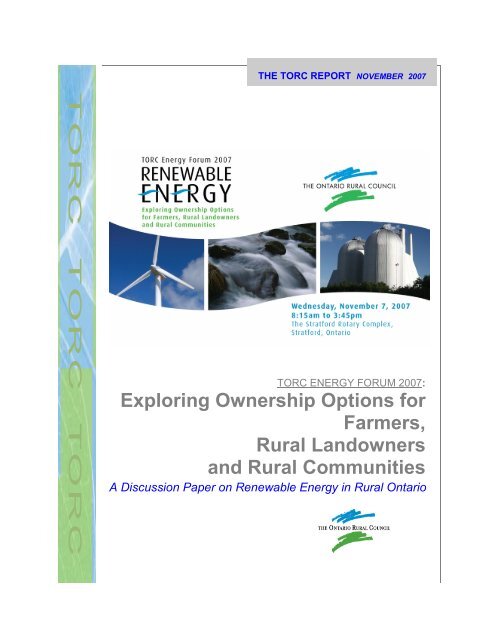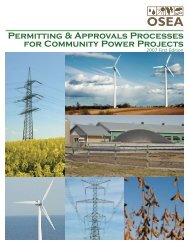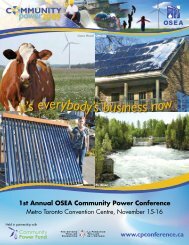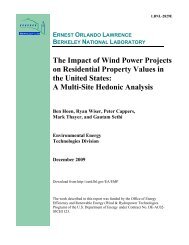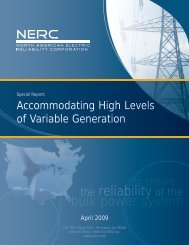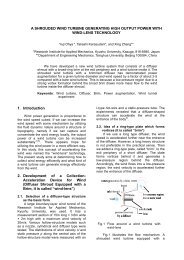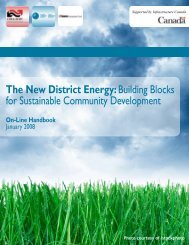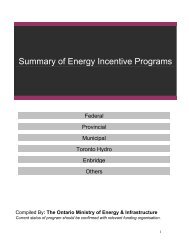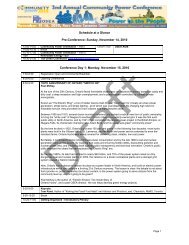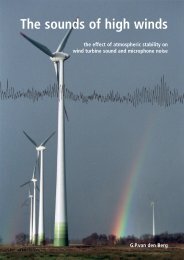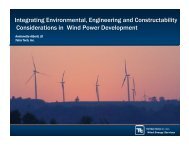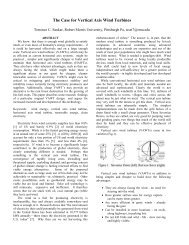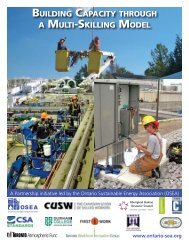Exploring Ownership Options for Farmers, Rural ... - OSEA
Exploring Ownership Options for Farmers, Rural ... - OSEA
Exploring Ownership Options for Farmers, Rural ... - OSEA
Create successful ePaper yourself
Turn your PDF publications into a flip-book with our unique Google optimized e-Paper software.
THE TORC REPORT NOVEMBER 2007<br />
TORC T ORC T ORC<br />
TORC ENERGY FORUM 2007:<br />
<strong>Exploring</strong> <strong>Ownership</strong> <strong>Options</strong> <strong>for</strong><br />
<strong>Farmers</strong>,<br />
<strong>Rural</strong> Landowners<br />
and <strong>Rural</strong> Communities<br />
A Discussion Paper on Renewable Energy in <strong>Rural</strong> Ontario
Contents<br />
Forum Partners Page…………………………………..……...…...3<br />
About The Ontario <strong>Rural</strong> Council (TORC)……………………..…4<br />
Executive Summary……………………………………..……….....6<br />
Introduction……………………………………………………….….8<br />
Key Issues………………………………………………………….10<br />
Recommendations <strong>for</strong> Action………………….……………....14<br />
Appendix 1 – Glossary of Terms and Abbreviations…………..16<br />
Appendix 2 – Forum Agenda…………………………………..…19<br />
Appendix 3 – Forum Speakers………………………………...…21<br />
The Ontario <strong>Rural</strong> Council (TORC)<br />
Ontario AgriCentre<br />
100 Stone Road West, Suite 109<br />
Guelph, ON N1G 5L3<br />
www.torc.on.ca<br />
THE TORC REPORT on Renewable Energy: <strong>Exploring</strong> Renewable Energy <strong>Ownership</strong> <strong>Options</strong> <strong>for</strong><br />
<strong>Farmers</strong>, <strong>Rural</strong> Landowners and <strong>Rural</strong> Communities (November, 2007)<br />
Page 2
TORC gratefully acknowledges the support of the following<br />
in presenting the TORC Energy Forum 2007:<br />
<br />
<br />
<br />
<br />
<br />
<br />
<br />
<br />
<br />
<br />
<br />
<br />
<br />
<br />
<br />
<br />
<br />
<br />
<br />
Agriculture and Agri-Food Canada<br />
Agricultural Adaptation Council - CanAdvance Program<br />
AgEnergy Co-operative<br />
“Building Bridges to Better Business Program”, Ontario<br />
Ministry of Small Business and Entrepreneurship (SBE)<br />
Bruce Grey Huron Perth Georgian Triangle Training Board<br />
Christian <strong>Farmers</strong> Federation of Ontario (CFFO)<br />
Conestoga-Rovers & Associates (CRA)<br />
EPCOR<br />
Green Breeze Inc.<br />
Hydro One<br />
Ontario Federation of Agriculture (OFA)<br />
Ontario Ministry of Agriculture, Food and <strong>Rural</strong> Affairs (OMAFRA)<br />
Ontario Ministry of Energy<br />
Ontario Ministry of Natural Resources (MNR)<br />
Ontario Sustainable Energy Association (<strong>OSEA</strong>)<br />
Ontario Co-operative Association (On Co-op)<br />
Perth Community Futures (CFDC)<br />
Strat<strong>for</strong>d/Perth Centre <strong>for</strong> Business<br />
Strat<strong>for</strong>d/Perth Small Business Enterprise Centre<br />
THE TORC REPORT on Renewable Energy: <strong>Exploring</strong> Renewable Energy <strong>Ownership</strong> <strong>Options</strong> <strong>for</strong><br />
<strong>Farmers</strong>, <strong>Rural</strong> Landowners and <strong>Rural</strong> Communities (November, 2007)<br />
Page 3
About The Ontario <strong>Rural</strong> Council (TORC)<br />
As a <strong>for</strong>um <strong>for</strong> all rural voices, The Ontario <strong>Rural</strong> Council (TORC) offers a vital<br />
venue <strong>for</strong> rural engagement in the <strong>for</strong>m of dialogue, collaboration, action and<br />
advocacy. As a member-driven, multi-sector, provincial organization, TORC<br />
strives to foster communication that in<strong>for</strong>ms and ultimately helps shape and<br />
influence policy, programs and research development affecting today’s rural<br />
Ontario.<br />
Members share a commitment to strong, healthy, vibrant rural communities,<br />
businesses and organizations. Through Public Issue Forums and our <strong>Rural</strong><br />
Development Conference, TORC provides the only venue dedicated to drawing<br />
together the collective rural voice, working to break down the silos between<br />
sectors and encourage effective partnerships <strong>for</strong> progress.<br />
TORC Members represent non-profit organizations, private sector organizations,<br />
the public sector, and individuals with specialized expertise and resources in rural<br />
matters. In our role as convenor, TORC brings together these diverse interests<br />
and perspectives and offers valuable networking opportunities to link people,<br />
in<strong>for</strong>mation and activities in support of rural community development and<br />
capacity building.<br />
The TORC Mission:<br />
• To act as a catalyst <strong>for</strong> rural dialogue, collaboration, action and advocacy<br />
TORC Aims To:<br />
• Foster communications that in<strong>for</strong>m – with the aim to influence and shape<br />
– policies, program and research development affecting rural Ontario<br />
• Enhance the understanding of rural realities<br />
• Act as a broker and clearinghouse of news, stories and research – linking<br />
local, regional, provincial and global thinking<br />
• Build innovative rural networks that stimulate the <strong>for</strong>mation of provincewide<br />
collaboration<br />
• Be an outcomes-focused learning organization<br />
TORC and Renewable Energy<br />
TORC, in collaboration with our membership and rural stakeholders, works to<br />
identify emerging rural issues and opportunities and facilitates stakeholder<br />
discussions related to the issue. Within this framework, renewable energy was<br />
THE TORC REPORT on Renewable Energy: <strong>Exploring</strong> Renewable Energy <strong>Ownership</strong> <strong>Options</strong> <strong>for</strong><br />
<strong>Farmers</strong>, <strong>Rural</strong> Landowners and <strong>Rural</strong> Communities (November, 2007)<br />
Page 4
identified by the TORC Environmental Working Group in early 2007 as an issue<br />
taking on an increasingly significant profile in our Ontario rural landscape.<br />
Interest grew and a partnership planning committee was quickly cultivated from<br />
those partners keen to work with TORC in producing a one-day learning Forum<br />
on Renewable Energy. The focus was to identify a full scope of recommended<br />
actions to be undertaken to enhance the development of renewable energy in<br />
Ontario.<br />
<strong>Rural</strong> Ontario is seen to have the potential of playing a key role in the “greening<br />
of Ontario”. The generation of energy from a range of renewable energy sources<br />
has real and significant benefits to the environment, as well as our rural and<br />
provincial economies. To that end, The Ontario <strong>Rural</strong> Council joined a host of<br />
partners in presenting the TORC Forum on Renewable Energy: <strong>Exploring</strong><br />
<strong>Ownership</strong> <strong>Options</strong> <strong>for</strong> <strong>Farmers</strong>, <strong>Rural</strong> Landowners and <strong>Rural</strong> Communities<br />
in Strat<strong>for</strong>d (ON) in early November, 2007. It was deemed an ideal measure to<br />
ensure stakeholders work collectively to help in<strong>for</strong>m provincial policy, program<br />
and research development around desired renewable energy objectives moving<br />
<strong>for</strong>ward.<br />
Acknowledgments<br />
TORC would like to acknowledge the work of York Sustainable Enterprise<br />
Consultants in the recording and preparation of this report.<br />
THE TORC REPORT on Renewable Energy: <strong>Exploring</strong> Renewable Energy <strong>Ownership</strong> <strong>Options</strong> <strong>for</strong><br />
<strong>Farmers</strong>, <strong>Rural</strong> Landowners and <strong>Rural</strong> Communities (November, 2007)<br />
Page 5
Executive Summary<br />
It is clear the converging threats of climate change and high and volatile energy<br />
prices will prove daunting <strong>for</strong> Ontario’s rural communities and agricultural sector.<br />
However, it is equally clear that the agricultural community is one of the most<br />
resilient and resourceful in coping with hardship. Many proven solutions <strong>for</strong><br />
energy independence and mitigating environmental harm exist and are in use in<br />
agricultural communities around the world. Renewable energy projects are<br />
<strong>for</strong>emost among these solutions and present economic, environmental and social<br />
benefits <strong>for</strong> the communities they serve.<br />
Renewable energy projects can significantly reduce energy costs, as well as<br />
provide new income streams, from on-farm systems to individuals and cooperatives<br />
in rural areas. This increase in revenue can help to hedge against<br />
uncertain fossil fuel prices. By capturing the energy from agricultural by-products,<br />
in the case of biogas, or natural energy flows, in the case of wind and water,<br />
communities can make more efficient and sustainable use of their natural<br />
resources.<br />
Renewable energy operations typically produce little or no greenhouse gas<br />
emissions and are there<strong>for</strong>e critical in mitigating the effects of climate change.<br />
Biogas systems provide the added benefit of converting methane, a highly potent<br />
greenhouse gas, into less harmful carbon dioxide. These projects also produce<br />
energy with no resulting toxic wastes or smog-causing particulate emissions.<br />
These projects will improve power system reliability by decentralizing energy<br />
production through a greater number of smaller facilities. For our rural<br />
communities, this translates into more jobs as it pertains to the construction,<br />
operation and maintenance of these facilities. The risk of power outages is<br />
reduced because power production is spread across a greater number of<br />
facilities. Also, due to the smaller scale of these projects, local ownership is much<br />
more feasible, meaning that far more of the revenue from these projects cycles<br />
back through the community.<br />
Governments around the world are interested and actively engaged in developing<br />
and implementing policies and programs to support renewable energy. The<br />
Province of Ontario has taken steps to provide a policy environment whereby the<br />
private sector, co-operatives, individuals, communities and municipalities can be<br />
actively engaged in this sector.<br />
Within this framework, The Ontario <strong>Rural</strong> Council (TORC), in partnership with a<br />
host of organizations, presented a one-day Renewable Energy Forum in Strat<strong>for</strong>d<br />
(ON) in November, 2007 with the intentions of exploring the challenges of<br />
renewable energy development in Ontario and the potential actions needed to<br />
capitalize on this emerging opportunity.<br />
THE TORC REPORT on Renewable Energy: <strong>Exploring</strong> Renewable Energy <strong>Ownership</strong> <strong>Options</strong> <strong>for</strong><br />
<strong>Farmers</strong>, <strong>Rural</strong> Landowners and <strong>Rural</strong> Communities (November, 2007)<br />
Page 6
The TORC Forum on Renewable Energy: <strong>Exploring</strong> <strong>Ownership</strong> <strong>Options</strong> <strong>for</strong><br />
<strong>Farmers</strong>, <strong>Rural</strong> Landowners and <strong>Rural</strong> Communities provided a valuable<br />
dialogue among speakers and participants from which emanated a list of distinct<br />
themes and recommendations in addressing renewable energy issues in Ontario.<br />
Emerging Themes:<br />
• Grid access and connectivity costs<br />
• Methodology <strong>for</strong> RESOP rate design<br />
• Unified voice <strong>for</strong> policy advocacy<br />
• Education of financial services institutions<br />
• Benefits of local ownership: job creation, local investment and the local<br />
economic multiplier effect<br />
A full exploration of the Emerging Themes begins on Page Seven (7) and <strong>for</strong>ms<br />
the bulk of this TORC Report. Forum participants also identified a number of<br />
recommendations intended to address the existing issues and challenges in<br />
realizing the renewable energy potential in Ontario. The Recommendations <strong>for</strong><br />
Action can be found on Page Eleven (11) of this Report.<br />
Currently there are a number of political, regulatory, infrastructure and financing<br />
barriers to the establishment of small-scale renewable energy projects in Ontario.<br />
These can be overcome, and the consensus of most rural interests is that they<br />
must be overcome through the following recommended policy actions:<br />
• A <strong>for</strong>mal commitment by the Government of Ontario to distributed power<br />
and renewable energy<br />
• A RESOP pricing program differentiated by technology, project size and<br />
resource intensity, along with a suite of complementary financial incentives<br />
• Investment in grid infrastructure and lower connectivity costs <strong>for</strong> small<br />
renewable energy generators<br />
• Investment in research, education and training in renewable energy<br />
technology and project development<br />
<strong>Rural</strong> Ontario can play a key role in ensuring a reliable and sustainable supply of<br />
renewable energy <strong>for</strong> the benefit of all Ontarians. <strong>Rural</strong> stakeholders must<br />
provide a clear direction to policymakers by recommending these actions with a<br />
unified voice.<br />
THE TORC REPORT on Renewable Energy: <strong>Exploring</strong> Renewable Energy <strong>Ownership</strong> <strong>Options</strong> <strong>for</strong><br />
<strong>Farmers</strong>, <strong>Rural</strong> Landowners and <strong>Rural</strong> Communities (November, 2007)<br />
Page 7
Introduction<br />
Global Context<br />
The TORC Renewable Energy Forum was set against a backdrop of converging<br />
global issues directly related to our current energy use patterns. The booming<br />
economies of some countries in the developing world (e.g. China, India, Brazil)<br />
have significantly increased the demand <strong>for</strong> fossil energy worldwide and this<br />
trend shows few signs of slowing. The result of this, as cheaper fossil resources<br />
are depleted, will be increasing and more volatile energy prices. The commodity<br />
market’s recent flirt with $100/barrel crude oil is a telling sign. At the same time,<br />
consumption of fossil energy over the last century has led to a buildup of heattrapping<br />
greenhouse gases in the atmosphere, now understood to be the<br />
principal driver of increasingly rapid climate change. Almost any measure to<br />
address climate change will, out of necessity, involve further increases in the<br />
price of fossil fuels. The inescapable reality <strong>for</strong> the global agricultural community,<br />
which is most directly affected by weather patterns and <strong>for</strong> which high energy<br />
prices can erase slim profit margins, is high vulnerability in the face of these<br />
converging threats. It was clear from the attendance at the Renewable Energy<br />
Forum, that these global issues are having direct impacts here in Ontario.<br />
Ontario Context<br />
This is a critical time <strong>for</strong> Ontario’s electricity sector. According to the Ontario<br />
Power Authority (OPA), due to aging infrastructure and increasing demand,<br />
Ontario will build almost as much generating capacity over the next 20 years as<br />
exists in the province today. 1 The Provincial Government only plans <strong>for</strong> 5% of<br />
electricity to be supplied by renewable sources by 2007 and 10% by 2010. 2 This<br />
is an overly modest amount of new renewable generation given the experience of<br />
other countries that have rapidly deployed large amounts of renewable energy<br />
generating capacity. 3<br />
Some of these new renewable energy projects will come online as a result of<br />
Ontario’s groundbreaking Renewable Energy Standard Offer Program (RESOP).<br />
The existing policies that inspired RESOP have proven successful in countries<br />
such as Germany and Spain. The program is a constructive first step toward a<br />
suite of policies that will support the installation of new renewable generating<br />
1 Integrated Power System Plan Quick Facts, Ontario Power Authority:<br />
http://www.powerauthority.on.ca/IPSP/Storage/50/4578_Quick_facts_on_IPSP_FINAL.pdf<br />
2 Ontario Ministry of Energy, Renewable Energy page:<br />
http://www.energy.gov.on.ca/index.cfm?fuseaction=english.renewable<br />
3 See slide #16 of Henning Holst’s presentation: http://www.torc.on.ca/HenningHolst_000.pdf.pdf<br />
THE TORC REPORT on Renewable Energy: <strong>Exploring</strong> Renewable Energy <strong>Ownership</strong> <strong>Options</strong> <strong>for</strong><br />
<strong>Farmers</strong>, <strong>Rural</strong> Landowners and <strong>Rural</strong> Communities (November, 2007)<br />
Page 8
capacity. It is significant in that it provides the opportunity <strong>for</strong> small generators in<br />
agricultural communities to feed their renewable power into distribution<br />
infrastructure. This provides an additional revenue stream to help hedge against<br />
energy price volatility while reducing emissions of greenhouse gases. The vast<br />
potential of the renewable energy flows in Ontario presents an important<br />
opportunity to address issues of rural economic development, climate change<br />
and the resilience of the province’s energy system. It must become a top priority<br />
<strong>for</strong> government, farmers and rural communities.<br />
This <strong>for</strong>um was inspired by the need to supply a greater amount of Ontario’s<br />
power from renewable energy resources and the opportunity <strong>for</strong> rural<br />
stakeholders to take up this challenge through net-metering and RESOP<br />
mechanisms.<br />
THE TORC REPORT on Renewable Energy: <strong>Exploring</strong> Renewable Energy <strong>Ownership</strong> <strong>Options</strong> <strong>for</strong><br />
<strong>Farmers</strong>, <strong>Rural</strong> Landowners and <strong>Rural</strong> Communities (November, 2007)<br />
Page 9
Key Issues <strong>for</strong> Building the Renewable Energy Capacity of<br />
<strong>Farmers</strong>, <strong>Rural</strong> Landowners and <strong>Rural</strong> Communities<br />
<br />
Grid Access and Connectivity Costs<br />
One of the greatest barriers facing renewable energy generators in Ontario is the<br />
difficulty and cost involved in connecting to the power distribution infrastructure.<br />
All RESOP generators and net-metering customers are required to pay <strong>for</strong> the<br />
network upgrades and extensions necessary to interconnect their projects. This<br />
is a significant cost that does not exist <strong>for</strong> centralized generators who are able to<br />
pass on such infrastructure costs to Ontario ratepayers. In other jurisdictions<br />
such as Germany, there is a legal obligation to connect renewable generation to<br />
the grid and infrastructure costs <strong>for</strong> renewable generators holding feed-in tariff<br />
contracts are built into the rate base. 4 In the German context where these<br />
contracts are much more prevalent, it is estimated that these charges to ratepaying<br />
customers amount to an insignificant $3 CAD/month. This small<br />
incremental cost also finances the price premium guaranteed to renewable<br />
generators in their contracts.<br />
Another significant grid interconnection barrier exists <strong>for</strong> a major expanse of<br />
prime farmland stretching from Owen Sound in the north to Orangeville in the<br />
east, and all along Lake Huron down to the Longwood trans<strong>for</strong>mer station just<br />
west of London. In this transmission constraint zone or ‘orange zone,’ grid<br />
capacity is set aside so that the distribution lines can accommodate additional<br />
nuclear generation expected in the future from the Bruce Power plant. 5<br />
Another grid issue in Ontario is the fact that prospective renewable energy<br />
developers can in effect “reserve” grid space up to two years be<strong>for</strong>e construction,<br />
often shutting out small generators who already have building permits to<br />
construct their projects. Grid access is one of the most significant barriers facing<br />
prospective renewable power generators in Ontario.<br />
4 See slide #4 of Henning Holst’s presentation: http://www.torc.on.ca/HenningHolst_000.pdf.pdf<br />
Also see the main features of the German Act on granting priority to renewable energy sources:<br />
http://www.bmu.de/files/english/renewable_energy/downloads/application/pdf/eeg_gesetz_merkm<br />
ale_en.pdf<br />
5 Ontario Power Authority, Questions and Answers on Bruce Transmission:<br />
http://www.powerauthority.on.ca/Page.asp?PageID=122&ContentID=6408&SiteNodeID=120<br />
THE TORC REPORT on Renewable Energy: <strong>Exploring</strong> Renewable Energy <strong>Ownership</strong> <strong>Options</strong> <strong>for</strong><br />
<strong>Farmers</strong>, <strong>Rural</strong> Landowners and <strong>Rural</strong> Communities (November, 2007)<br />
Page 10
Methodology <strong>for</strong> RESOP Rate Design<br />
Another key issue is the OPA’s concept of “value to ratepayers” used to<br />
determine the RESOP rate per kilowatt-hour (kWh) offered to generators.<br />
Electricity feed-in rates need to account <strong>for</strong> differences in a project’s technology,<br />
size, application and resource intensity. For example, Graeme Millen of Genesys<br />
Biogas noted that under current rates, on-farm biogas projects command the<br />
same price (11¢/kWh) as wind power projects despite major differences in these<br />
technologies and their application. Moreover, many participants noted that the<br />
current RESOP rate of 11¢/KWh <strong>for</strong> biogas projects is too low to provide a<br />
reasonable return on investment, especially <strong>for</strong> smaller operators. It was<br />
concluded that the RESOP rate of 11¢/kWh cents is insufficient and needs to be<br />
re-structured based on the actual cost of generating electricity from biogas<br />
operations.<br />
The Ontario Power Authority (OPA) does not account <strong>for</strong> the value of the<br />
beneficial environmental attributes of biogas development in its current RESOP<br />
rates beyond greenhouse gas mitigation from the replacement of fossil fuels as<br />
the energy source. These environmental attributes include reduced pathogens in<br />
digested manure leading to higher rural water quality, waste diversion from<br />
landfills, and methane capture.<br />
Finally, gaining ownership of the carbon credits associated with renewable<br />
energy production was another improvement to RESOP that participants are<br />
seeking. At present, the OPA claims all such credits if/when they become<br />
available.<br />
<br />
A Unified Voice <strong>for</strong> Policy Advocacy<br />
It was clear at the <strong>for</strong>um that a number of different voices, NGOs, community<br />
organizations, and co-operatives, share similar views and goals related to<br />
renewable energy. As indicated by Kristopher Stevens from <strong>OSEA</strong>, the collective<br />
political clout of all these organizations is <strong>for</strong>midable and reaching consensus on<br />
these issues through dialogue, especially at events like this <strong>for</strong>um, is necessary<br />
to more effectively promote the recommendations offered in this report. It is clear,<br />
when it comes to renewable energy generation, that no single technology is<br />
superior in all circumstances; that each has its strengths and weaknesses that<br />
complement one another. This gives greater weight to the argument that<br />
proponents of renewable energy, regardless of specific technology, can and must<br />
align their ef<strong>for</strong>ts to advocate <strong>for</strong> critical issues that they have in common.<br />
THE TORC REPORT on Renewable Energy: <strong>Exploring</strong> Renewable Energy <strong>Ownership</strong> <strong>Options</strong> <strong>for</strong><br />
<strong>Farmers</strong>, <strong>Rural</strong> Landowners and <strong>Rural</strong> Communities (November, 2007)<br />
Page 11
Education of Financial Services Institutions<br />
Substantial grid-connected, renewable energy projects are relatively new to<br />
Ontario and are a novel concept <strong>for</strong> many financial and insurance professionals.<br />
Due to uncertainty surrounding these new technologies, both of these sectors are<br />
likely to overestimate the risks associated with renewable energy projects.<br />
Many of the <strong>for</strong>um participants observed that raising funds <strong>for</strong> the initial stages of<br />
a community-owned renewable energy project can be quite challenging. It is<br />
precisely at this initial stage that a project’s risks are highest due to significant<br />
uncertainty associated with planning, obtaining approvals <strong>for</strong>, and commissioning<br />
a renewable energy installation. For these reasons, private sources of funding,<br />
especially from financial institutions, are often difficult to obtain.<br />
Significant education of financial and regulatory institutions as well as insurance<br />
companies is needed to simplify financing of community-based renewable energy<br />
projects.<br />
<br />
Benefits of Local <strong>Ownership</strong>: Job Creation, Local Investment and<br />
the Local Economic Multiplier Effect<br />
The development of locally-owned renewable energy projects can bring many<br />
social and economic benefits. Local ownership and control was suggested and<br />
promoted by many <strong>for</strong>um speakers as the key to maximizing these benefits.<br />
According to Patrick Côté of Val-Éo Co-opérative in Québec, when these projects<br />
are developed privately, local communities often miss out on associated social<br />
and economic benefits. Local control over the project tends to reduce any<br />
potential conflict and strengthens support <strong>for</strong> the project. Local involvement in the<br />
development process often results in better knowledge of the project, ultimately<br />
leading to better decisions. Investment in locally-owned projects tends to provide<br />
at least three times the local economic benefit compared to those owned by<br />
absentee shareholders. 6<br />
The potential benefits <strong>for</strong> the community from renewable energy projects can be<br />
classified as follows:<br />
6 The Iowa Policy Project, Small Packages, Big Benefits – Economic Advantages of Local Wind<br />
Projects: http://www.iowapolicyproject.org/2005docs/050405-wind.pdf<br />
Institute <strong>for</strong> Local Self-Reliance, Wind and Ethanol – Economies and Diseconomies of Scale:<br />
http://www.newrules.org/de/scalereport.pdf<br />
THE TORC REPORT on Renewable Energy: <strong>Exploring</strong> Renewable Energy <strong>Ownership</strong> <strong>Options</strong> <strong>for</strong><br />
<strong>Farmers</strong>, <strong>Rural</strong> Landowners and <strong>Rural</strong> Communities (November, 2007)<br />
Page 12
Social Benefits:<br />
• Offers a socially responsible investment <strong>for</strong> the community<br />
• Increases local acceptance: Local ownership, community involvement and<br />
member education encourages acceptance<br />
• Promotes the acquisition of new skills <strong>for</strong> community members<br />
Economic Benefits:<br />
• Stimulates local economic development by promoting local employment,<br />
creating new short- and long-term jobs in manufacturing, project development,<br />
operation and maintenance, insurance, accounting and legal services, etc<br />
• Promotes new investments throughout the community<br />
• Strengthens rural communities by generating a new source of income <strong>for</strong><br />
farmers and rural landowners<br />
• Increases tax revenue <strong>for</strong> municipalities these new revenues could be<br />
reinvested in the community<br />
• Saves energy and money: Generating energy closer to where it is used<br />
reduces “line losses” and reduces the need <strong>for</strong> and cost of transmission and<br />
distribution infrastructure<br />
• Educates and raises awareness among community members about the link<br />
between energy production and consumption<br />
The German experience gave participants an example of how local economies<br />
have benefited greatly from investment in their own renewable energy resources.<br />
Since the introduction of the feed-in tariff legislation in Germany, the wind power<br />
sector alone has created 74,000 new jobs in manufacturing, project development,<br />
operation and maintenance, insurance, accounting and legal services, etc. Much<br />
of this employment is locally or regionally-based. 7<br />
7 See slide #12 of Henning Holst’s presentation: http://www.torc.on.ca/HenningHolst_000.pdf.pdf<br />
THE TORC REPORT on Renewable Energy: <strong>Exploring</strong> Renewable Energy <strong>Ownership</strong> <strong>Options</strong> <strong>for</strong><br />
<strong>Farmers</strong>, <strong>Rural</strong> Landowners and <strong>Rural</strong> Communities (November, 2007)<br />
Page 13
Recommendations <strong>for</strong> Action<br />
Government of Ontario<br />
o<br />
o<br />
o<br />
o<br />
o<br />
The Government should <strong>for</strong>mally commit to and invest in distributed power<br />
and renewable energy.<br />
The Government should offer a suite of complementary financial<br />
incentives to encourage investment in locally-owned renewable power<br />
such as low- or zero-interest loans, provincially-sponsored bonds <strong>for</strong><br />
renewable power development.<br />
Property tax classification and assessment <strong>for</strong> on-farm renewable energy<br />
systems should be consistent across all renewable energy types (wind,<br />
biogas, etc.) and not serve as disincentives to investment in on-farm<br />
renewable energy projects.<br />
There should be financial support to universities, community colleges and<br />
other post-secondary educational institutions to conduct research in and<br />
implement training programs on renewable energy technologies and<br />
renewable energy project development.<br />
Co-op legislation should recognize the indirect nature of energy<br />
transactions since renewable energy co-ops must sell their energy to the<br />
grid be<strong>for</strong>e it can be purchased by members.<br />
Ontario Power Authority (OPA)<br />
o<br />
o<br />
o<br />
o<br />
RESOP prices paid to renewable energy generators should be<br />
differentiated by technology, application, project size and resource<br />
intensity in order to accurately reflect the true cost a particular installation<br />
and provide a reasonable rate of return to the generator.<br />
Biogas generators should be rewarded <strong>for</strong> the additional environmental<br />
benefits resulting from their operations such as the capture of methane<br />
gas, pathogen reduction improving rural water quality and waste diversion<br />
from landfills.<br />
Generators, not the OPA, should retain carbon credits associated with<br />
renewable power production.<br />
Until the transmission constraint zone (“orange zone”) can be removed<br />
through increased investment in grid infrastructure the orange zone should<br />
be made more flexible to allow small renewable generation to come online<br />
THE TORC REPORT on Renewable Energy: <strong>Exploring</strong> Renewable Energy <strong>Ownership</strong> <strong>Options</strong> <strong>for</strong><br />
<strong>Farmers</strong>, <strong>Rural</strong> Landowners and <strong>Rural</strong> Communities (November, 2007)<br />
Page 14
in this important agricultural area with abundant wind and biomass<br />
resources.<br />
o<br />
The approval processes at HydroOne and other LDCs, the Ontario Energy<br />
Board and the OPA should be significantly streamlined with respect to<br />
both time and cost.<br />
Hydro One and other Local Distribution Companies<br />
o HydroOne and LDCs should develop a culture of distributed renewable<br />
power.<br />
o HydroOne and LDCs should establish vigorous training and customer<br />
service programs to rapidly connect new generators to their networks.<br />
o Hydro One should undertake major “smart grid” revitalization and an<br />
overhaul of the power transmission and distribution system such that smallscale,<br />
distributed energy projects can more easily be accommodated.<br />
o<br />
Net-Metering should be a clear and simple process offering generators<br />
transparent access to all in<strong>for</strong>mation and the ability to monitor their own<br />
installation.<br />
NGO Sector<br />
o<br />
o<br />
NGOs should coordinate advocacy ef<strong>for</strong>ts with elected representatives<br />
and with senior officials in the Ontario Government to seek sound policies<br />
and better energy prices and conditions from energy agencies.<br />
NGOs should educate financial, regulatory and insurance institutions<br />
about renewable energy technologies, their risks and benefits in order to<br />
reduce uncertainty and eliminate any misconceptions that may persist.<br />
Commercial Sector<br />
o<br />
The commercial sector should actively cultivate business partnerships with<br />
local stakeholders to achieve a greater degree of local ownership and<br />
control over renewable energy projects. This has been demonstrated<br />
elsewhere to be good business practice and a source of competitive<br />
advantage <strong>for</strong> renewable energy developers.<br />
THE TORC REPORT on Renewable Energy: <strong>Exploring</strong> Renewable Energy <strong>Ownership</strong> <strong>Options</strong> <strong>for</strong><br />
<strong>Farmers</strong>, <strong>Rural</strong> Landowners and <strong>Rural</strong> Communities (November, 2007)<br />
Page 15
Appendix 1 – Glossary of Terms and Abbreviations<br />
Organizations<br />
CEC: Countryside Energy Cooperative.<br />
CFA: Canadian Federation of Agriculture, a national umbrella organization representing provincial<br />
farm organizations and commodity groups.<br />
CFFO: Christian <strong>Farmers</strong> Association of Ontario.<br />
FSCO: Financial Services Commission of Ontario, the body that regulates cooperatives, trust<br />
companies, credit unions, insurance brokers and pensions in Ontario.<br />
HONI: Hydro One Networks Inc., <strong>for</strong>merly part of Ontario Hydro. Hydro One is responsible <strong>for</strong> the<br />
transmission system, as well as the distribution system in much of rural and northern Ontario.<br />
OEB: Ontario Energy Board, regulators of Ontario’s electricity and natural gas sectors.<br />
OFA: Ontario Federation of Agriculture.<br />
OMAFRA: Ontario Ministry of Agriculture, Food and <strong>Rural</strong> Affairs, responsible <strong>for</strong> legislation and<br />
policy <strong>for</strong> Ontario’s agri-food industries and rural communities.<br />
Ontario Ministry of Energy: Responsible <strong>for</strong> legislation and policy <strong>for</strong> the electricity industry in<br />
Ontario. It governs and oversees the OEB, IESO, Hydro One, etc.<br />
OPA: Ontario Power Authority.<br />
<strong>OSEA</strong>: Ontario Sustainable Energy Association.<br />
OWA: Ontario Waterpower Association.<br />
Terms<br />
Biogas: A renewable biofuel comprised mainly of methane and carbon dioxide. It is the product of<br />
the the anaerobic digestion or fermentation of biomass such as manure or sewage, municipal<br />
waste, and energy crops.<br />
CIA: Connection Impact Assessment, an assessment completed by the LDC to determine if<br />
upgrades to the distribution system are necessary prior to project connection. Voltage impacts,<br />
loading, currents, etc., are considered.<br />
Community Power: Community Power is a class of sustainable energy projects that are owned,<br />
developed and controlled in full or in part by residents of the community in which the project is<br />
THE TORC REPORT on Renewable Energy: <strong>Exploring</strong> Renewable Energy <strong>Ownership</strong> <strong>Options</strong> <strong>for</strong><br />
<strong>Farmers</strong>, <strong>Rural</strong> Landowners and <strong>Rural</strong> Communities (November, 2007)<br />
Page 16
located. In order to meet <strong>OSEA</strong>’s definition of Community Power, projects must meet the following<br />
five-fold criteria:<br />
1. More than 50% ownership control is retained by primary and secondary CP investors at<br />
all times.<br />
2. A minimum of 5% ownership control is retained by primary CP investors at all times.<br />
3. More than 50% of all gross revenues over the first 20 years of a project accrue to<br />
primary and secondary CP investors.<br />
4. Contractual details (land lease, share offering, etc.) are transparent and public.<br />
5. All local residents have the ability to participate financially.<br />
(<strong>OSEA</strong> defines primary investors as geographically local citizens and CP groups and<br />
secondary investors as non-local citizens and CP groups).<br />
Constraint Zone: Due to distribution and transmission line congestion there are certain restricted<br />
zones where no or limited contracts will be offered under the Standard Offer Program.<br />
Hydropower: The <strong>for</strong>ce or energy of moving water, sometimes called hydraulic power. It may be<br />
captured <strong>for</strong> electric power generation.<br />
IESO: Independent Electricity System Operator, the body that balances the flow of electricity<br />
throughout Ontario.<br />
KW: Kilowatt, a measure of electricity consumption or production equal to one thousand watts.<br />
KWh: Kilowatt-hour, a measure of electricity consumed by a continuous load or produced by the<br />
continuous generation of one kilowatt over one hour.<br />
LDC: Local Distribution Company, the utility that supplies electricity to customers in a municipality<br />
or region.<br />
MW: Megawatt, a measure of electricity production or consumption equal to one million watts.<br />
MWh: Megawatt-hour, a measure of electricity consumed by a continuous load or produced by the<br />
continuous generation of one megawatt over one hour, equivalent to one thousand kWh.<br />
Net Metering: A program <strong>for</strong> small renewable energy generators (generating 500kW or less)<br />
allowing them to offset the costs of their own energy use with the amount of energy that they are<br />
producing.<br />
NIMBY or NIMBYism: Not In My Backyard; a term often used to characterize local opposition<br />
toward capital projects.<br />
THE TORC REPORT on Renewable Energy: <strong>Exploring</strong> Renewable Energy <strong>Ownership</strong> <strong>Options</strong> <strong>for</strong><br />
<strong>Farmers</strong>, <strong>Rural</strong> Landowners and <strong>Rural</strong> Communities (November, 2007)<br />
Page 17
NGO: Non-governmental organization, a broad term used to indicate an organization that is not a<br />
government entity, though the term typically denotes an organization that is not a <strong>for</strong>-profit<br />
organization.<br />
Orange Zone: See Constraint Zone.<br />
PPA: Power purchase agreement, a contract between a producer and consumer to sell and<br />
purchase electricity over time.<br />
PST: Provincial Sales Tax, or Retail Sales Tax.<br />
RESOP: Ontario’s Renewable Energy Standard Offer Program, whereby higher than market rates<br />
are paid to generators of power from renewable energy sources.<br />
SOC: Standard offer contract, Ontario’s program offering a standardized rate <strong>for</strong> electricity<br />
produced by small or community-based renewable power projects.<br />
THE TORC REPORT on Renewable Energy: <strong>Exploring</strong> Renewable Energy <strong>Ownership</strong> <strong>Options</strong> <strong>for</strong><br />
<strong>Farmers</strong>, <strong>Rural</strong> Landowners and <strong>Rural</strong> Communities (November, 2007)<br />
Page 18
Appendix 2 - TORC Forum AGENDA<br />
TORC PRESENTS:<br />
Renewable Energy:<br />
<strong>Exploring</strong> <strong>Ownership</strong> <strong>Options</strong> <strong>for</strong> <strong>Farmers</strong>, <strong>Rural</strong> Landowners and <strong>Rural</strong> Communities<br />
Wednesday, November 7, 2007<br />
The Strat<strong>for</strong>d Rotary Complex ● 353 McCarthy Road West ● Strat<strong>for</strong>d, ON<br />
8:15 – 8:45 a.m. Registration<br />
8:45 – 9:00 a.m. Welcome and Opening Remarks<br />
o Harold Flaming, Executive Director, TORC<br />
o John Kikkert, President, CFFO<br />
9:00 - 10:30 a.m. Local Renewable Energy: Opportunities, Benefits & Risks<br />
Q + A (20 mins)<br />
o Moderator: Kris Stevens, Policy and Communications, Ontario<br />
Sustainable Energy Association (<strong>OSEA</strong>)<br />
o Speakers:<br />
The German Experience: Henning Holst, Wind Energy<br />
Consultant to farmers<br />
The Biogas Experience: Laurie Stanton / Garry Fortune,<br />
Stanton Bros. Ltd., Ilderton<br />
The Wind Co-op Experience: Lloyd Craw<strong>for</strong>d, Co-op<br />
Development Manager, Countryside Energy Co-operative Inc.<br />
10:30 a.m. – 10:45 a.m. Refreshment Break<br />
10:45 a.m. – 12:00 p.m. Market <strong>Options</strong> <strong>for</strong> Small Projects (< 10 megawatts)<br />
o Moderator: Ted Cowan, Research/Policy Development, Ontario<br />
Federation of Agriculture (OFA)<br />
o Speakers:<br />
Renewable Energy Standard Offer Program (RESOP) + Net<br />
Metering – Biogas: Benjamin Strehler, Genesys Biogas<br />
Renewable Energy Standard Offer Program (RESOP) + Net<br />
Metering – Wind: Cornell Feenstra, Feenstra Electric Ltd.<br />
Renewable Energy Standard Offer Program (RESOP) Barriers:<br />
Jon Kieran, Coordinator, Distributed Energy, Ontario Ministry of<br />
Energy<br />
THE TORC REPORT on Renewable Energy: <strong>Exploring</strong> Renewable Energy <strong>Ownership</strong> <strong>Options</strong> <strong>for</strong><br />
<strong>Farmers</strong>, <strong>Rural</strong> Landowners and <strong>Rural</strong> Communities (November, 2007)<br />
Page 19
Q + A (20 mins)<br />
12:00 – 1:15 p.m. Lunch<br />
o Speakers:<br />
Dan Mathieson, Mayor of Strat<strong>for</strong>d<br />
1:15 – 3:00 p.m. <strong>Ownership</strong> <strong>Options</strong> <strong>for</strong> <strong>Farmers</strong>, <strong>Rural</strong> Landowners and <strong>Rural</strong><br />
Communities<br />
Q + A (20 mins)<br />
o Moderator: Deborah Doncaster, Executive Director, Ontario<br />
Community Power Fund<br />
o Speakers:<br />
Net-metering <strong>for</strong> Individual Development – Wind: Carol<br />
Leeming, Leeming Farms Ltd., Sea<strong>for</strong>th (ON)<br />
Co-operative Model: Jen Heneberry , Co-op Development<br />
Officer, Ontario Co-operative Association<br />
Collaborative Model: Henning Holst, Wind Energy Consultant<br />
to farmers<br />
Val-Éo Co-operative Model: Patrick Côté, Val-Éo, Saint Bruno,<br />
Quebec<br />
3:00 - 3:15 p.m. Refreshment Break<br />
3:15 – 3:45 p.m. Renewable Energy Technology 101<br />
(Choose 1 of the 3 breakout sessions)<br />
Biogas<br />
o Moderator:<br />
o Speakers:<br />
Wind<br />
o Moderator:<br />
o Speakers:<br />
Water<br />
o Moderator:<br />
o Speakers:<br />
Benjamin Strehler, Genesys Biogas<br />
Jake DeBruyn and Don Hilborn, Ontario Ministry of<br />
Agriculture, Food and <strong>Rural</strong> Affairs (OMAFRA)<br />
Deborah Doncaster, Community Power Fund<br />
Cornell Feenstra (small wind projects) and Henning<br />
Holst (large wind projects)<br />
Kevin Edwards, Ontario Ministry of Natural Resources<br />
(MNR)<br />
Paul Norris, President, Ontario Waterpower<br />
Association<br />
3:45 – 4:00 p.m. Wrap up<br />
THE TORC REPORT on Renewable Energy: <strong>Exploring</strong> Renewable Energy <strong>Ownership</strong> <strong>Options</strong> <strong>for</strong><br />
<strong>Farmers</strong>, <strong>Rural</strong> Landowners and <strong>Rural</strong> Communities (November, 2007)<br />
Page 20
Appendix 3 – TORC Energy Forum SPEAKERS<br />
<br />
Henning Holst<br />
Mr. Holst is what many of us would consider a pioneer. After 10 years working in both the private<br />
and public sector on construction projects, Mr. Holst transitioned into the role of wind energy<br />
developer, working with local citizens on projects of varying scales. During the last 17+ years, he<br />
has achieved a great deal of success along the road to becoming Germany’s <strong>for</strong>emost wind<br />
energy consultant to the farm community, gaining invaluable insight on best practices and<br />
lessons learned. More recently, Mr. Holst has concluded work on one of Germany’s first ‘repowering<br />
projects’, where old turbines were replaced by newer technology with higher<br />
per<strong>for</strong>mance characteristics. The project, located on an island in the Baltic Sea, is owned by 150<br />
resident families, representing 100% local ownership.<br />
<br />
Laurie Stanton / Garry Fortune<br />
<br />
Lloyd Craw<strong>for</strong>d<br />
A graduate of both Ridgetown Agricultural College and a four-year Canadian Institute of<br />
Management program from the University of Waterloo, Mr. Craw<strong>for</strong>d has worked in the<br />
agricultural co-operative system in southwestern Ontario <strong>for</strong> 35 years, holding various positions<br />
from sales to branch management to regional manager <strong>for</strong> United Co-operatives of Ontario<br />
(1968-1992). Mr. Craw<strong>for</strong>d managed the merger of Strat<strong>for</strong>d and Mitchell Co-op to <strong>for</strong>m Perth<br />
County Co-operative in 1995, and expanded the business to $65 million in sales with branches<br />
throughout Perth operating feed, crops, stores, petroleum and grain marketing business. He<br />
retired as general manager in April, 2003, but continues to provide business consulting services.<br />
He has been instrumental in the developmental stages of setting up Countryside Energy Cooperative<br />
as a community-owned and –operated energy co-operative.<br />
<br />
Benjamin Strehler<br />
Mr. Strehler graduated in 1997 from the Federal Institute of Technology in Zurich (Switzerland) in<br />
Environmental Engineering. Prior to moving to Canada in 2003, Mr. Strehler held the position of<br />
Chief Engineer <strong>for</strong> international renewable energy project development in Zurich at a private<br />
sector company. His current position as Vice President at Genesys Biogas Inc. involves the<br />
development and implementation of biogas systems in Ontario and Canada.<br />
<br />
Cornell Feenstra<br />
The owner of Cornell Feenstra Electric Ltd. since 1982, Mr. Feenstra is a Registered Master<br />
Electrician and Electrical Contractor who provides project resource services <strong>for</strong> a communitybased<br />
wind co-op. Among his many accomplishments and designations, he holds several skills<br />
certification endorsements from the Ontario Ministry of Skills Development <strong>for</strong> electronic controls,<br />
THE TORC REPORT on Renewable Energy: <strong>Exploring</strong> Renewable Energy <strong>Ownership</strong> <strong>Options</strong> <strong>for</strong><br />
<strong>Farmers</strong>, <strong>Rural</strong> Landowners and <strong>Rural</strong> Communities (November, 2007)<br />
Page 21
is recognized by the Electrical Utilities Safety Association of Ontario <strong>for</strong> training in safety and<br />
proficiency in hydraulic aerial equipment, is a certified heating and cooling load consultant<br />
through the Ontario Electrical League, and holds several service training certificates <strong>for</strong> industrial<br />
generators and controls, transfer switches and marine generators and controls. Mr. Feenstra is a<br />
member of several professional organizations and is actively involved in the Ontario Youth<br />
Apprenticeship Program.<br />
<br />
Jon Kieran<br />
Mr. Kieran manages distributed energy policy <strong>for</strong> the Ministry of Energy, having joined the<br />
Ministry in February, 2007. From 2002-06, Mr. Kieran operated a consulting company in the field<br />
of renewable energy commercialization. His key assignment was to act as European Director of<br />
Sales <strong>for</strong> a large American renewable energy technology firm. Prior to 2002, Mr Kieran spent<br />
several years at Ontario Hydro and Hydro One, as a manager in the international sales subsidiary<br />
and corporate development division. He has an extensive background in marketing, corporate<br />
relations and M&A due diligence. Mr. Kieran earned his MSc. in economics from LSE (University<br />
of London).<br />
<br />
Carol Leeming<br />
Leeming Farms was founded in 1987 when proprietors Carol and Bob Leeming purchased a 100-<br />
acre farm in Tuckersmith Township near Sea<strong>for</strong>th, Huron County. The main farm products are<br />
Corn, Soybeans, Wheat, Eggs and, more recently, Wind. Ms. Leeming graduated from the<br />
University of Guelph with a Bachelor of Arts (1987) and Masters of Science (1995). In 2005, she<br />
graduated from Class 10 of the Advanced Agricultural Leadership Program (AALP) where she<br />
had the opportunity to study renewable energy on the farm. Ms. Leeming is currently a Board<br />
member of the Centre <strong>for</strong> Applied Renewable Energy in Brussels (ON) and a member of the<br />
Countryside Energy Co-operative—which has a renewable energy focus including communityowned<br />
wind. In Spring 2006, Leeming Farms erected an 80kw wind turbine and began producing<br />
electricity out to the electrical grid through a Net Metering agreement with Hydro One.<br />
<br />
Jen Heneberry<br />
Ms. Heneberry is the Co-operative Development Co-ordinator with the Ontario Co-operative<br />
Association (On Co-op). Her primary areas of responsibility include assisting in the development<br />
of co-operatives by matching them with the technical assistance and required coaching, and by<br />
connecting them with other co-ops offering support and resources. Ms. Heneberry has been<br />
involved with a number of community initiatives in the Hamilton area since 1999, including the<br />
City of Hamilton’s VISION 2020 and Air Quality initiatives, as well as the myHamilton project<br />
(<strong>for</strong>merly Connect Hamilton). She also spent more than two years working with the Positive<br />
Power Co-operative as General Manager, helping to develop both community-owned renewable<br />
energy projects in the Bay Area and the renewable energy co-op sector. Ms. Heneberry has<br />
degrees in Chemistry and Environmental Sciences from McMaster University, and a Volunteer<br />
Management Certificate from Mohawk College. She is also a graduate of the Hamilton-Burlington<br />
Bay Area Leadership program and a member of the Bay Area Leadership Curriculum<br />
Committee. Currently, Ms. Heneberry is the 2007-08 Chair of the Board of Directors of the<br />
Conserver Society of Hamilton and District, and a member of the Hamilton Eco-Network Steering<br />
Committee.<br />
THE TORC REPORT on Renewable Energy: <strong>Exploring</strong> Renewable Energy <strong>Ownership</strong> <strong>Options</strong> <strong>for</strong><br />
<strong>Farmers</strong>, <strong>Rural</strong> Landowners and <strong>Rural</strong> Communities (November, 2007)<br />
Page 22
Patrick Côté<br />
Mr. Côté is a founder and general manager of Co-op Val-Éo and Val-Éo limited partnership which<br />
was <strong>for</strong>med in 2005 to address the issues of community involvement in the wind project located in<br />
the Lac-Saint-Jean Area. The business structure he created has allowed landowners to fully<br />
control and manage the wind resource and Mr. Côté now provides coaching and tools <strong>for</strong> wind<br />
energy projects in Quebec, Ontario and Manitoba. Equipped with a strong background in local<br />
economic development, entrepreneurship and leadership training, Mr. Côté has also worked in<br />
the community surrounding the projected wind farm as an economic development counselor with<br />
public and private organizations. This experience has given him a deeper understanding of the<br />
important issues that affect the wind farm area, as well as how best to maximize social<br />
acceptability of the process.. He holds a Bachelor degree in business administration from École<br />
des Hautes Études Commerciales de Montréal.<br />
<br />
Jake DeBruyn<br />
Mr. DeBruyn is the New Technology Integration Engineer <strong>for</strong> the Ontario Ministry of Agriculture,<br />
Food and <strong>Rural</strong> Affairs (OMAFRA). He is based in the Guelph office and covers Halton and Peel<br />
Regions <strong>for</strong> environmental and farm nuisance issues under the Farming and Food Production<br />
Protection Act. Mr. DeBruyn’s work over the last few years at the Ministry has spanned from<br />
Nutrient Management to odour to washwater, and most recently to energy opportunities. He is<br />
currently active in encouraging the deployment of an agri-food biogas sector in the province.<br />
<br />
Don Hilborn<br />
Mr. Hilborn, M.Sc. (Eng.), P. Eng., is the Byproduct/Manure Management Engineer with the<br />
Ontario Ministry of Agriculture, Food and <strong>Rural</strong> Affairs (OMAFRA). He has conducted courses on<br />
Agricultural Pollution Control, Concrete Manure Storages, Custom Manure Application and<br />
Nutrient Management. During the last 12 years, a major portion of his work has been focused on<br />
linking manure management systems with cropping processes. Mr. Hilborn has been in the<br />
<strong>for</strong>efront with the Ministry’s ef<strong>for</strong>t to develop user-friendly, yet environmentally acceptable nutrient<br />
management in<strong>for</strong>mation. He has also helped develop and support nutrient management<br />
regulations both on a municipal and provincial basis. Recently, Mr. Hilborn has been exploring<br />
renewable energy production via treatment of manure, energy crops and other organic materials<br />
using an Anaerobic Digestion (AD) system. He has viewed systems in Europe and is currently<br />
involved in research/feasibility studies on several Agricultural AD systems in Ontario.<br />
<br />
Paul Norris<br />
Mr. Norris is the founding President of the Ontario Waterpower Association (OWA), a nongovernment<br />
organization established in May, 2001 to represent the collective interests of the<br />
province’s waterpower industry. Mr. Norris joined the OWA following a career with the Ontario<br />
Public Service that included senior policy and management positions in public lands, water<br />
resources, fisheries, wildlife and communications. He has represented waterpower interests on<br />
the Minister of Energy’s Electricity Conservation and Supply Task Force, was appointed to the<br />
Minister of the Environment’s Clean Energy Panel on Environmental Assessment and is co-chair<br />
of the province’s Renewable Energy Task Team.<br />
THE TORC REPORT on Renewable Energy: <strong>Exploring</strong> Renewable Energy <strong>Ownership</strong> <strong>Options</strong> <strong>for</strong><br />
<strong>Farmers</strong>, <strong>Rural</strong> Landowners and <strong>Rural</strong> Communities (November, 2007)<br />
Page 23


